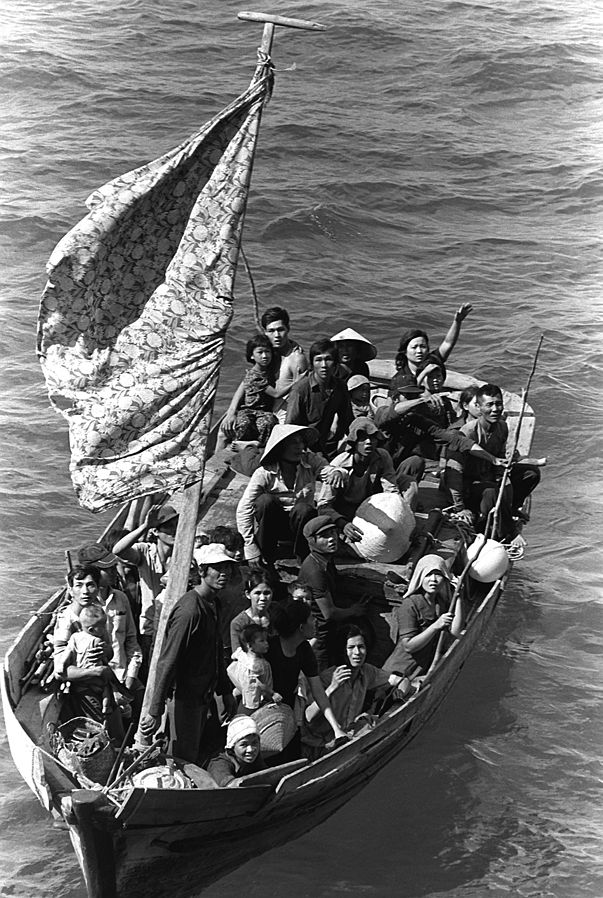A coalition of nine advocacy organizations throughout the United States initiated a joint campaign this week, urging President Joe Biden to grant clemency to Vietnamese, Cambodian, and Laotian refugees from the Vietnam War, as reported by Prism.
These refugees fled persecution from war-torn countries. Upon entering the U.S., they settled into neglected, withdrawn communities and ended up with criminal convictions and incarcerations.
Fearing promises of immediate deportation under the incoming Trump administration, the effort aims to assist approximately 15,000 refugees holding final orders of removal from the U.S. due to decades-long convictions.
Thursday’s commutations of sentences for nearly 1,500 individuals and 39 pardons made Biden’s move the largest granting of clemency in a single day by a modern U.S. president. However, his announcement did not specifically mention clemency for immigrants.
Those at the Southeast Asia Resource Action Center celebrated the momentous moment. Nonetheless, executive director Quyên Đinh said that many individuals were “still waiting for their second chance, like the 15,000 Southeast Asian Americans with deportation orders eager for the day they can live without fear of being separated from their families and communities.”
Biden has had a long history regarding refugees from the Vietnam War, from supporting the Indochina Migration and Refugee Assistance Act in 1975, allowing 130,000 Vietnam War refugees asylum in the United States, to deporting Vietnamese refugees with old criminal records in his first 100 days in office.
Tien Pham is one of 30 Vietnamese Americans in March 2020 who faced deportation back to Vietnam from Texas—one of thousands of people under Biden’s administration. His family, originally from North Vietnam, fled to the US when he was 13 years old in 1996 and lived in poverty in California–working long hours in low-wage jobs.
At age 17, Pham was convicted of attempted murder. Being tried as an adult, he was sentenced to 28 years. Behind bars, Pham “received multiple degrees and certifications, helped teach an ethnic studies program and worked for a prisoner-run newspaper,” according to the Guardian. After strong endorsements from community members and approval from the governor, Pham was scheduled for release on August 31, 2020, but was apprehended immediately by Immigration and Customs Enforcement (ICE) and deported back to Vietnam.
Community defense program manager Van Sam at VietLead, a nonprofit serving the Southeast Asian communities in Philadelphia and South Jersey, said pushing for pardons is a way to hold the establishment accountable for 1. U.S. military intervention, and 2. The criminalization of resettled Southeast Asian refugees.
As a senator, Biden also backed the 1994 crime bill, which included criminalizing refugee children under the tough-on-crime laws.
“So we are asking Biden: Can you take responsibility for the fact that our people are now being separated from our families once again?” Sam said.
The Southeast Asian Refugee Relief and Responsibility (SEARR) Campaign asks Biden to grant clemency to Southeast Asians with federal-level convictions–opening up the path for final orders of removal to be nullified, explained Socheatta Meng at Mekong NYC, a Southeast Asian advocacy organization in New York.
“Final orders of removal” are immigration judge-issued decisions that an individual did or could not appeal. Although noncitizens can be granted “deferred action,” a form of clemency issued at the discretion of ICE.
Tom Homan, Trump’s appointed “border czar,” has previously stated the administration’s intent to first target those with final orders of removal as mirrored in Trump’s first term as president. In the first half of his presidency, the removal of Cambodians increased by 279% and Vietnamese by 58%, according to SEARAC. Just Security reported that violated a 2008 memorandum by President George W. Bush.
A majority of Trump’s deportations date back to Biden sponsoring the Illegal Immigration Reform and Immigrant Responsibility Act (IIRIRA) of 1996, expanding the crimes making an immigrant eligible for deportation–including nonviolent crimes.
Many Southeast Asian refugees are now naturalized by obtaining permanent residency (a green card) and applying for citizenship after five years.
However, “lots of folks just never naturalized or got their citizenship because of language barriers and lack of access to resources,” Kevin Lam, co-executive director at the Asian American Resource Workshop, said. Despite years of living and working in the U.S. as a refugee or a permanent resident, any noncitizen can still be subject to deportation.
Efforts to end deportations of Southeast Asians have previously been introduced in Congress by Congresswoman Judy Chu, Pramila Jayapal, Zoe Lofgren, and Ayanna Pressley, but died out in the Republican-majority House of Representatives.
Support our June Membership Drive and receive member-only benefits. We are 27% of our goal of $10,000 in new donations and monthly and annual donation pledges by the end of the Month.
We are published by the non-profit Asian American Media Inc and supported by our readers along with the Robert Wood Johnson Foundation, AARP, Report for America/GroundTruth Project & Koo and Patricia Yuen of the Yuen Foundation.
You can make your tax-deductible donations here via credit card, debit card, Apple Pay, Google Pay, PayPal and Venmo. Stock donations and donations via DAFs are also welcomed. Contact us at info @ asamnews dot com for more info.




